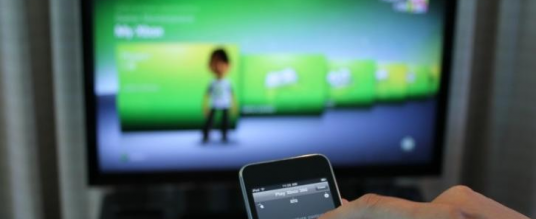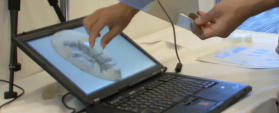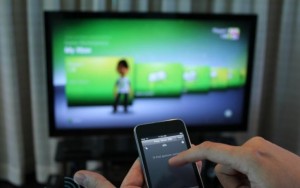The Web TV Race Will Be Decided By The Smartphone

Via BusinessInsider
Four Reasons Why The Web TV Race Will Be Decided By The Smartphone
There is no question that the Web-to-TV space picked up momentum in 2010 thanks to the Google TV launch and the Apple TV makeover. Despite these gains, not much has been done to seamlessly integrate the mobile and TV experience, as can clearly be seen by the lack of adoption in the everyday living room.
It is also obvious that mobile devices are quickly becoming the primary computing device for consumers, and it makes sense to harness mobile in order to bring the Web experience to the living room. Also, no one single truly groundbreaking solution has yet been released for Web-to-TV. Here are four reasons why winning in mobile is the key to capturing this market.
1. Discover all available content, not just what is served to you
We are quickly moving toward a world where all content and knowledge will be stored online. Cable and satellite dish providers may provide users thousands of channel options, but it would take millions of channels to access all the content that is already on the Web. There will be an estimated 500 billion videos available for download from the Web by 2014. Current connected TV products are really just walled gardens of content– only allowing us to watch a portion of what is available on the Web.
Mobile devices on the other hand are leading the push to bring the full Web to smaller platforms, while keeping it simple enough for all users. Whether it’s the contributions of pioneers such as Apple iOS or RIM BlackBerry OS, which created the incentive for mobile websites, or Google Android OS that has integrated full Adobe Flash capability to phones– more and more of the Web is at people’s fingertips, whenever and wherever they want it.
2. The TV remote simply wasn’t designed for today’s content discovery behavior
One issue with transitioning from traditional cable or satellite dish services to the vast library of vide on the Internet is that the Web is organized differently from the familiar numbered channels. This makes the current TV remote control, with simple numeric and up and down controls entirely inadequate for online video. It is practically impossible for anyone to use the current remote to navigate– let alone search– the millions of ‘Web Channels’ that are out there already.
In the mobile world, engineers have created clever and novel ways to browse Web content — giving us the power to control the Internet in a package that is often smaller than your current TV remote. Compared to today’s leading Web-to-TV solutions, Google TV and Apple TV, which require you to type and search from 10 feet away, a solution that integrates the intuitive search and discovery capabilities available on mobile devices will have a clear advantage.
3. People are already using mobile phones while watching TV
According to a recent study by Yahoo! 86 percent of mobile Web users are now simultaneously using their smartphone or tablets while watching TV, and many of these folks are performing search and discovery of content that is contextually related to what they are watching on TV. These days, it’s just as easy to search on your mobile device as it is on your computer. In fact, with the addition of voice search you can argue that it’s actually easier. We all use our phones to discover new things, whether searching the mobile Web, using an educational app or getting an email. Using the phone as a TV remote is the next logical step in the technology evolution process.
4. Real-time discovery and sharing makes TV social
Combining mobile devices and Internet connected TVs allows you to go beyond sharing content in your home. You can now share your favorite baseball highlights or YouTube videos with anyone of your friends around the world. If it were made easily possible, everyone would share video from mobile devices instantly with their friends on the TV’s larger screen. We already look to our social network to find shows and movies we might like. Discovering video to watch in real-time and sharing it with friends from mobile devices will bring a whole new social element to TV.
The Web-to-TV space is only beginning to get competitive as newer technologies arrive on the scene. One thing is clear: the true winner in this market will need to seamlessly integrate mobile devices with the TV to capitalize on the ubiquity of the smartphone.






